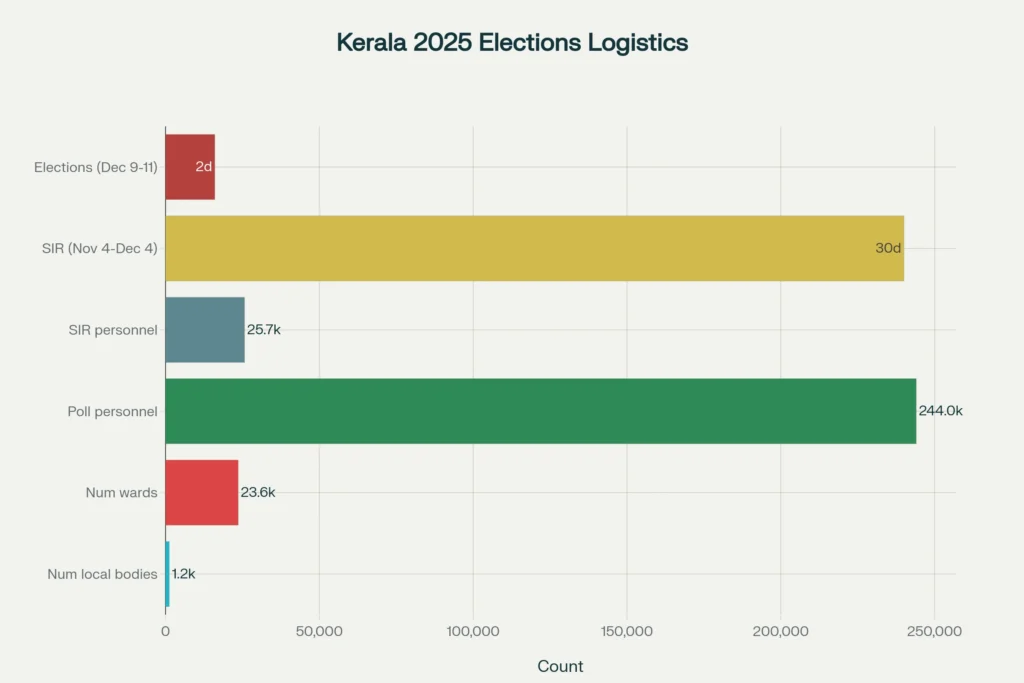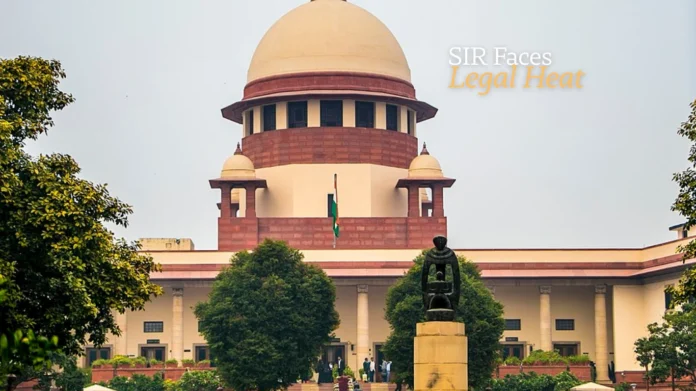Key Highlights
- Supreme Court issues notice to Election Commission of India on Kerala government’s plea to defer Special Intensive Revision Kerala of electoral rolls until after local body elections.
- The Special Intensive Revision Kerala overlaps with Kerala’s Local Self-Government Institutions (LSGI) elections set for December 9 and 11, 2025, creating administrative challenges.
- Several political parties contest the Special Intensive Revision Kerala citing pressure on state resources and possible voter disenfranchisement.
Opening Overview
The Supreme Court of India has addressed the controversy around the Special Intensive Revision Kerala by issuing a notice to the Election Commission of India (ECI) on November 21, 2025. The Kerala government filed a plea seeking deferment of the Special Intensive Revision Kerala exercise, citing a direct conflict with local body elections slated for December 2025. Multiple political parties from Kerala have challenged the Special exercise, highlighting concerns about administrative feasibility and electoral fairness. The Supreme Court scheduled hearings for November 26 to decide on these petitions.
A crucial electoral roll verification process, aims to update voter lists ahead of the 2026 assembly elections. Yet, the Kerala government argues that conducting the Special Intensive Revision Kerala simultaneously with local body elections will overstretch staff and resources.
Administrative Challenges with Concurrent Special Intensive Revision Kerala
- Kerala’s local body elections cover 1,200 local bodies and 23,612 wards scheduled for December 9 and 11, 2025.
- The state deploys about 176,000 government personnel plus 68,000 police for elections; the Kerala requires additional manpower, causing strain.
The Kerala government stresses that simultaneously holding the Special Intensive Revision Kerala and local body elections is nearly impossible. With more than 176,000 personnel and 68,000 police involved in the election machinery which demands thousands more for house-to-house enumeration risks administrative overload. The government petition insists the Special Intensive Revision Kerala delay until after the elections to allow smooth execution.
This logistical squeeze endangers the accuracy and fairness of both the Intensive Revision and elections. The state fears this overlap will lead to delays and compromised voter roll integrity. The Chief Secretary’s order calls for the Special Intensive Revision Kerala to be deferred until December 21, post-election, to avoid administrative chaos.
Special Intensive Revision 2026#ceokerala #ecisveep #eci #ChiefElectoralOfficer #ElectionAwareness #VoterAwareness #ElectoralProcess #Sveepkerala #Elections #VoteIndia #EveryVoteCounts #MyVoteMyRight #DemocracyMatters #VoteResponsibly #YourVoteYourVoice #SIR2026 #SIRKerala pic.twitter.com/UWaIys5ie6
— Chief Electoral Officer Kerala (@Ceokerala) November 18, 2025
Political Opposition and Fairness Issues
- Major parties such as CPI(M), CPI, and Indian Union Muslim League contest the Special Intensive Revision Kerala claiming it targets their voter bases.
- CPI’s petition highlights possible disenfranchisement risking constitutional voter rights during the Special Intensive Revision Kerala.
Political parties in Kerala have vocally opposed the Special Intensive Revision Kerala. The CPI(M) and CPI have petitioned the Supreme Court not only to defer but also stop, arguing it is strategically designed to exclude opposition voters. CPI states the arbitrarily threatens the constitutional right to universal franchise.
The Indian Union Muslim League raised concerns that overlapping the elections and the Model Code of Conduct diminishes the efficiency of Booth Level Officers (BLOs). These parties see the Special Intensive Revision Kerala as politically motivated, risking electoral roll manipulation, and undermining democratic processes ahead of critical elections. Comparisons to Bihar’s SIR experience add urgency to these apprehensions.
The Kerala Legislative Assembly has unanimously demanded that the Election Commission carry out a transparent revision of the voter list. Concerns have arisen that the Special Intensive Revision (SIR), as seen in Bihar, could lead to arbitrary exclusions, affecting marginalized… pic.twitter.com/tU3Xb4uT1X
— P Rajeev (@PRajeevOfficial) September 29, 2025
Legal and Constitutional Framework
- The Special Intensive Revision Kerala is authorized under Article 324 of the Indian Constitution and the Representation of the People Act, 1950.
- Tamil Nadu and West Bengal have joined in challenging the legality of the Supreme Court.
- The Supreme Court will consolidate the petitions on November 26, addressing federal concerns and election management linked to Special Intensive Revision Kerala.
The legal ground for Special Intensive Revision Kerala stems from the Election Commission’s constitutional authority (Article 324) and provisions under the Representation of the People Act, 1950, empowering electoral roll revisions. The exercise is intended to ensure complete and accurate voter lists.
Nevertheless, several states, including Tamil Nadu and West Bengal, have challenged the broad application, accusing the ECI of bypassing state consultations and overstepping federal boundaries. The Supreme Court’s forthcoming hearing will consider how the Kerala fits within the federal setup and election administration norms, potentially setting major precedents for electoral governance in India.

Final Perspective
The Supreme Court’s intervention on the Special Intensive Revision Kerala underscores the challenges of synchronizing election processes with electoral roll updates in democratic India. Kerala’s plea illustrates the complexities of managing large-scale electoral operations simultaneously without risking disenfranchisement or administrative collapse.
Political opposition and state concerns highlighting the Special Intensive Revision Kerala’s timing and method reflect the high stakes involved in electoral integrity and democracy. The Supreme Court’s decision on November 26 will be critical for defining the balance between efficient electoral roll maintenance and the practicalities of state election management. This case reiterates the need for electoral reforms that harmonize legal mandates, administrative capacity, and democratic fairness amid India’s federal structure.


